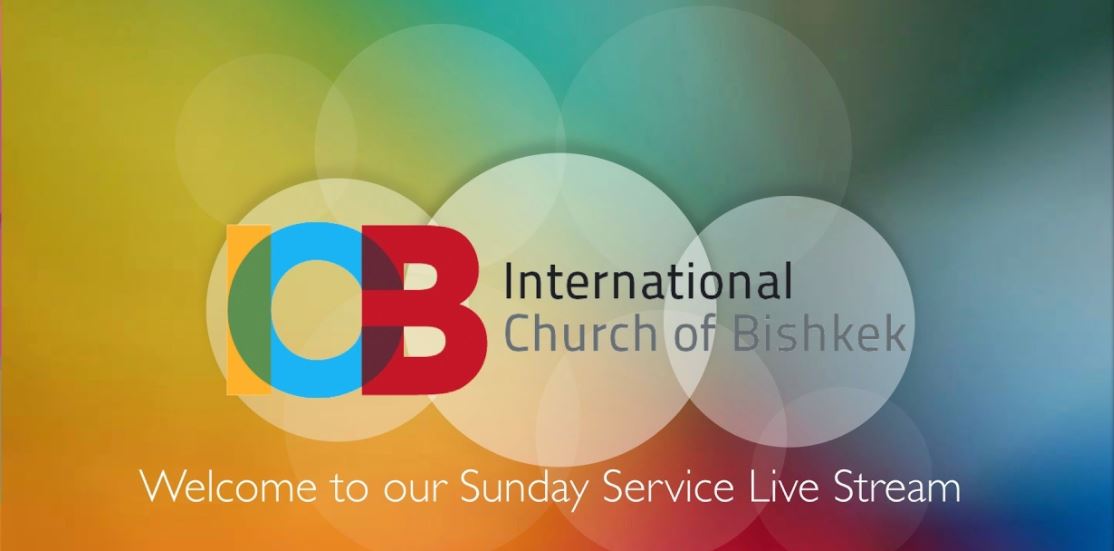|
photo by Laura Evans But if they had stood in my council, then they would have proclaimed my words to my people. Jeremiah 23:22 ESV Dear ICB family,
On Sunday we saw from Jeremiah 23 what is perhaps the defining characteristic of a false prophet: They were people who, without standing in God's council first, spoke their own thoughts as if they were God's. Throughout the Old Testament, God is portrayed as a king in a throne room surrounded by his heavenly council (Psalm 82:1; 89:1–5). That council is not there to give God advice. In fact, according to Jeremiah 23:18, people enter the council of God "to see and to hear his word," meaning they're not the ones doing the talking. God talks, and according to Jeremiah, those in his council are to pay attention to his word and listen. Very simply put, true prophets are those who have been counted among God's council, who have paid attention to and have listened to his words, and who then speak what they've heard to God's people. We might be discouraged by the distance that seems to separate us right now from God's heavenly throne room. How does a person today stand in God's council, hear his word, and with any certainty claim to speak those words to God's people? The Spirit Jesus promised his disciples this in John 16:12–15: "When the Spirit of truth comes, he will guide you into all the truth, for he will not speak on his own authority, but whatever he hears he will speak, and he will declare to you the things that are to come. He will glorify me, for he will take what is mine and declare it to you. All that the Father has is mine; therefore I said that he will take what is mine and declare it to you." In other words, the Spirit of God takes the words of God, declares them to the followers of the Son of God, and leads those followers into the truth of God. When the Spirit who lives within us speaks and we listen, we are standing in God's council. The Word The question then becomes, How do we hear the Spirit speak? Second Peter 1:21 says, "[N]o prophecy was ever produced by the will of man, but men spoke from God as they were carried along by the Holy Spirit." Who put the words in the prophets' hearts that were eventually recorded by the prophets' pens? The Holy Spirit. In other words, if you want to hear the Holy Spirit speak directly, open your Bible. He has spoken, and because his words are alive, he continues to speak through that same word even now. My Bible is printed on over 1300 pages. The Holy Spirit has a lot to tell us. This is how we enter the council of God today. The Spirit who lives within us speaks to us through the words of the Bible. We can stand in the council of God by listening to and paying attention to the Spirit as he speaks and guides us into all truth, and then—and only then—can we open our mouths and speak to others "as one who speaks oracles of God" (1 Peter 4:10–11). Just be warned: There are no shortcuts. The person whose heart is not filled with the Spirit of God and whose mind is not steeped in the words of God should not expect to enter into the council of God, meaning such a person should never claim to speak the message of God to the people of God. Are you filled with the Spirit, and do you know the Bible? Before you ever open your mouth to say a word, you must. Otherwise, you just might just find yourself lumped in with the false prophets of Jeremiah 23. Longing for God's council, Eric
0 Comments
Click on the image above to watch the service on our YouTube channel. Galatians 1:1-10; Jeremiah 23:16-24Galatians, a letter
Pray that your leaders would remain faithful to the gospel as laid out in Scripture and convey that gospel accurately and faithfully to God's people. Question for personal reflection and/or group discussion
Click on the image above to watch the service on ICB's YouTube channel. Psalm 24; acts 1:1-11; Ephesians 4:1-16Notice the connections (first made by Irenaeus in the second century) between the incarnation, death, resurrection, and ascension of Jesus and the creation, fall, redemption, and glorification of humanity.
Jesus' incarnation reflects our creation in that he became flesh and dwelt among us. His crucifixion reflects our fall in that he became sin for us. His resurrection reflects our new life and new birth in that we, too, have been given new life and have been raised with Christ. His ascension is the guarantee of our eventual glorification, when we shall be like him because we shall see him as he is. Psalm 24 is a predictive text that follows Jesus' coming, living on earth, and returning victorious to heaven. Acts 1:1-11 is a descriptive text that walks us through the time period between his resurrection and ascension. Ephesians 4:1-16 is an interpretative text that connects Jesus' ascension to the event that happened on Pentecost, namely, the outpouring of the Spirit, the defeating of many enemies, and the giving of gifts to God's people. Questions to for personal reflection and/or group discussion
photo by Laura So Abraham rose early in the morning, saddled his donkey, and took two of his young men with him, and his son Isaac. Genesis 22:3 ESV Dear ICB family,
Some time back, two friends of mine agreed to begin a trek through the stories of the Bible. Not too far into our survey we came to the story of Abraham sacrificing Isaac, and when we got to the end of the story and began talking about what it meant, one of the two, not a believer, mind you, said what seemed as clear as day to him: The point of this story is that Abraham loved God even more than he loved his own son. And in the end, it really does come down to that, doesn't it? Wait a second, you might say. Isn't this story about Abraham's obedience? Oh, I think it is about that. I just think it's about much more than that. Or you might ask, Doesn't this story basically show us Abraham's faith? Yes, I would answer, it does show us Abraham's faith, but I think there's even more to see here than just Abraham's faith. You see, according to Paul in 1 Corinthians 13, you could have mega faith, enough to move mountains, but if you don't have love, you're nothing. So while I do think Abraham had faith, I don't think that's all he had. And when it comes to obedience, obedience in and of itself is no virtue unless it flows out of a heart that loves to submit in faith to the one giving the commands. Notice Jesus' link between obedience and love: "If you love me, you will keep my commandments," he said (John 14:15). Mere commandment keeping is something God has never been interested in for its own sake. Did Abraham have faith? Yes. And his love for God ensured his faith wasn't "nothing" (see 1 Corinthians 13:2–3). Did Abraham show incredible obedience to God? Yes. And I can only conclude that his obedience flowed up and out of a heart full of love that motivated him to obey even the astonishing command that God gave him in Genesis 22:2 to take his son, his only son Isaac, whom God knew Abraham loved, and offer him as a sacrifice (see John 14:15). Do you love God that much? Do you love him enough to place your pet idols on the altar of sacrifice and bring down the knife? Are you willing to kill your pride for his sake? Are you willing to forsake literally anything and everything this world has to offer you in exchange for the "surpassing worth of knowing Christ Jesus my Lord" (Philippians 3:8)? Try this if you're not sure. In the following sentence, fill in the two blanks with literally anything you can possibly think of, and test how your heart responds to the thought. If I were ever faced with a situation in which I had to choose between _____ and Jesus, I would turn my back on _____ and chose Jesus. Here are some suggestions of words you might try out: my ministry, my profession, my reputation, my family, my spouse, my children, my friends, my passport country, my ethnicity, my culture, my socio-economic status, my savings account, my access to foreign currencies, my buying power against the devalued som, the latest technological gadget, the safety net that many generous people back home have provided for me, my access to healthcare, my education, my professional training, my degree(s), my social and professional connections, my spiritual gifts, my talents and abilities, the languages I can speak, my time, my resume, my past experiences, my rights, my privileges, my denominational affiliation, my honor, my current social standing, my seat of influence. Now try out all the words I haven't thought of. Oh, God, have mercy. May we, like Abraham, love you more than we love your good and gracious gifts to us. Grace and peace, Eric Click on the image above to watch the service on ICB's YouTube channel. Genesis 22Four lessons we can learn from this chapter
1. verses 1–2: Expect tests from God. God tested Abraham here and on several other occasions throughout his life. Sometimes Abraham passed the tests, and other times he failed. 2. verses 3–5: Put your eyes on God's promises not on explanations. Faith does not depend upon clear explanations but on promises.
3. verses 6–14: Depend on God for provision. Many of our trials we will have to face alone, without friends and family members, yet God is still with us.
4. verses 15–19: In trials look ahead at what God has for you. Questions for personal reflection and/or group discussion
Then Abimelech called Abraham and said to him, 'What have you done to us? And how have I sinned against you, that you have brought on me and my kingdom a great sin? You have done to me things that ought not to be done.' Genesis 20:9 ESV Dear ICB family, One of the most helpful discoveries I've come across when it comes to living this Christian life is the connection that exists between sin and unbelief. When you peel back the layers that surround a person's sinful lifestyle, at the core you will undoubtedly find an unbelieving heart. What's the connection between the two? You see, Satan has a single weapon in his arsenal. He wields that single weapon in so many diverse ways that we may be tempted to think he's got a lot more going on than he really does. The reality is, however, that Satan's sole tool is the same one he pulled out in the Garden of Eden to tempt Adam and Eve to eat from the tree of the knowledge of good and evil, and it's the same one he's been using ever since with mind-numbing success. Satan's only tool is that slippery, shape-shifting thing we call a lie. (It is not without reason that Jesus called him the father of lies [John 8:44].) Temptation, then, comes down to the simple question as to whom you're going to believe. Adam and Eve had to make a choice between believing what God had told them and believing what the serpent told them. In the exact same way, we face temptation today at the moment in which we are presented with two conflicting truth claims, one from God and one ultimately from the devil. God says one thing; the devil says something else. The question you must answer is Whom are you going to believe? Satan's only tool is that slippery, shape-shifting thing we call a lie. Why do people commit adultery? They believe the lie that an adulterous relationship will ultimately make them happier than were they to remain faithful to their spouses. They don't believe the promise that the house of an adulterous woman "sinks down to death" and "none who go to her come back, nor do they regain the paths of life" (Proverbs 2:18-19). Why do people sell their souls to pad their bank accounts and labor their entire lives for that which does not last? They believe the lie that having their hands on stuff is more satisfying than anything God might have to offer them. They don't believe the hope that God puts more joy in a person's heart than others have when their grain and wine abound (Psalm 4:7). Why do people in positions of power abuse that power for their own sake and in the process do great harm to those around them? They believe the lie that the greatest person is the one who can exert the most dominance over others and that life boils down to a zero-sum game, meaning my gain can only come at your loss. They don't believe Jesus' promise that "If anyone would be first, he must be last of all and servant of all" (Mark 9:35). And on and on we could go. I can't think of a single sin that isn't ultimately rooted in unbelief. In each case, a person has bitten into—hook, line, and sinker—a fat wriggly lie, and Satan is sitting on the shore just reeling in his catch. Temptation comes down to the simple question as to whom you're going to believe. So in the story of Abraham from Genesis 20, we're confronted with a very fearful prophet. What is his problem? Ultimately, his problem—just like yours and mine—is unbelief. That is, he was believing an alternate version of the truth that ran counter to what God had clearly revealed to him. At this point in the story, I see two different options that, I think, ultimately end up reaching the same conclusion. Here's what I mean: We don't know how much time passed between Genesis 18:14 where God repeats his promise that in a year's time Sarah will bear Abraham a biological son and Genesis 20:1 were Abraham traveled to Gerar, a city under King Abimelech. Perhaps Sarah wasn't pregnant yet. If that were the case, then what was Abraham so worried about? God had just shown up in person and told Abraham and Sarah that he was about to finally fulfill the promise that he had made 25 years ago. Would God let Abraham die right before he fulfilled his promise to him? Had not God already shown himself faithful to do exactly what he had said he would do? The only reason Abraham would have feared for his life would be that he didn't actually believe God was going to do what he had promised. And there it is: His sinful fear was rooted in unbelief. But there's another option. Perhaps Sarah was already pregnant by the time they went to Gerar, and perhaps they were well aware of the fact. Perhaps Abraham believed that God was going to fulfill his promise and that Sarah would actually bear them a son just like God had said; however, perhaps his fear was not rooted in his doubting God but in the fact that maybe he wouldn't live to see the promise fulfilled, even though he was confident that God would actually bring it to pass. As far as I can see in the text, God never promised that Abraham would actually live to see the birth of his promised son. So you might say something like, "Now wait a second. You argued here, Eric, that biblical faith is always connected to a concrete promise of God. If God hadn't told Abraham that he would actually live to see the birth of his promised son, then how is Abraham's fear in that case an example of unbelief? Wouldn't he be right to be afraid that Abimelech might kill him in the absence of a specific promise from God that his life would be spared?" I would still say, even in that case, that Abraham's fear is unbelief for this reason: Abraham knew God's character. Abraham asked God in Genesis 18:25, "Shall not the Judge of all the earth do what is just?" And God's resounding answer (which we were reminded of in this sermon), was a resounding "Yes, he will!" Here God does not come right out and state, "Hey, Abraham, I promise you that I will always do what is just." However, God's demonstration of his character is just as sure as if he had made Abraham an explicit promise. Abraham knew (and therefore should have trusted) that whatever else God did, he would for sure do what was just, and that would be true even if Abraham died at the hand of King Abimelech just months before his promised son was born. Even if Abraham lost his life, God would be acting with perfect justice. So there, too, Abraham's problem boils down to an issue of unbelief. He was acting as if God wouldn't truly act justly in the situation, no matter what, and therefore did not entrust his and Sarah's wellbeing to God. Not only that, God had explicitly commanded Abraham to "walk before me, and be blameless" (Genesis 17:1). Abraham's decision to deceive Abimelech reveals that in Abraham's mind, certain circumstances could demand the flouting of a clear command. Abraham thought that he knew better than to simply live a blameless life as God had told him, and that, too, is a clear demonstration of a heart of unbelief. Abraham sinned due to the lies that he had believed despite the contrary truth that God had already revealed to him. The way I see it, any way you slice it, Abraham's problem in Gerar was unbelief. He simply didn't trust that until God allowed Sarah to conceive a son by him, his life was guaranteed, and/or he didn't trust God enough to follow the clear command to live a blameless life and allow the Judge of all the earth to do what was just, even if that meant that obedience came at the cost of Abraham's life. In either case, Abraham sinned due to the lies that he had believed despite the contrary truth that God had already revealed to him.
"You will know the truth, and the truth will set you free," Jesus said in John 8:32. Only when we know the truth and believe it will we be able to be free of the enslaving chains of the devil's lies. And to think we have a book whose purpose is to wash over our minds that have since our first breath been soaking in the lies of this world, lies which we so easily and readily and all too often willingly believe. May you find freedom from sin as you put sin to death by believing what is true in place of believing whatever lie you are currently holding onto. Grace and peace, Eric Click on the image above to watch the service on our YouTube channel. Genesis 20; 1 john 4:13-20In this story we have a pagan king acting like a man of faith, and a prophet of God acting like a pagan of this world. What do we see in light of this low point in Abraham's life and faith?
We see God's
Questions for personal reflection and/or group discussion
photo by Laura Evans He then brought some curds and milk and the calf that had been prepared, and set these before them. While they ate, he stood near them under a tree. Genesis 18:8 NIV Dear ICB family,
As Pastor Neil pointed out, it is striking that the story of Abraham and his visitors, which only takes a few minutes to read, very easily took four to six hours to play out in real life. The text literally says that Abraham ran around making preparations for an absolutely over-the-top meal for his three unexpected visitors. Then, having served them the food, Abraham stood back in the shade of a tree while the three ate. In other words, Abraham wasn't sitting down at the table with them. He stood at the ready like an attentive servant. In fact, that's precisely what he had called himself to his guests: "your servant" (Genesis 18:3). And God ate calf, curds, milk, and apparently a lot of bread. If the image of a mere mortal literally serving God at table were not mind blowing enough, there is another image that might seem blasphemous were it not an image given on no less authority than Jesus Christ himself: After commanding his followers to be ready for his coming like servants waiting for their master to come home from a wedding feast, Jesus said, "Blessed are those servants whom the master finds awake when he comes. Truly, I say to you, he will dress himself for service and have them recline at table, and he will come and serve them" (Luke 12:37 ESV). Wait, wait, wait. What? Surely Jesus misspoke. Surely he meant to say, "Truly, I say to you, the servants will dress themselves for service and have his newly married master recline at table, and they will come and serve him," right? This is yet another example of the topsy-turvy nature of the kingdom of God. At least, it's topsy-turvy from our perspective. From God's perspective, it's just the way things are, and the way of this world is the abnormality. Yes, of course, we serve God. Abraham, Sarah, and their servants literally did so by making the three visitors lunch. And that was the right thing to do. Abraham would have been a jerk to send them on their way with an empty stomach, especially in light of the cultural expectations of the day. "Serve the LORD with gladness!" Psalm 100:2 (ESV) says. "Do not be slothful in zeal, be fervent in spirit, serve the Lord" Romans 12:11 (ESV) says. However, in all of our serving God, we must be aware that from God's perspective, ultimately he is the one serving his people. "[E]ven the Son of Man did not come to be served, but to serve, and to give his life as a ransom for many" (Mark 10:45 NIV). And God is not "served by human hands, as though he needed anything, since he himself gives to all mankind life and breath and everything" (Acts 17:25 ESV). You see, in all your acts of service to God, the reality is that God is serving you by giving you the strength and ability to serve. Peter says it this way: "Whoever serves, [let that person serve] as one who serves by the strength that God supplies—in order that in everything God may be glorified through Jesus Christ" (1 Peter 4:11). John Piper has said it this way: The giver gets the glory. To put it another way: The source shows its splendor. As you serve God—either by making a fantastic meal like Abraham and Sarah did or by preaching the gospel like Paul and Peter did or by making a profit from the minas that the master has entrusted to you like the servants in the parable in Luke 19 did—if you are utterly dependent on God and actively receiving from him literally everything you need to carry out those acts, you prove that you are, in fact, in the lowly position of needing someone to work on your behalf because you can't do it by yourself. In other words, you need a servant because you're too weak to get the job done on your own. To the extent that we serve God with any other demeanor—as if he needed something from us--we insult our God. It's in that way, then, that God serves us, even while we are in the very act of serving him. It's in that way that Christ served us when he offered his life as a ransom for many. And it's in that way that one day Christ will dress himself for service, seat his new bride at his lavish banquet table, and do absolutely everything on her behalf. Behold the God we serve. Though I nearly tremble to say it, we serve the Servant God. And as such, all glory is his. So go, and serve him in the strength that only he provides—in order that in everything God may be glorified through Jesus Christ. Humbled by the master Servant, Eric Click on the image above to watch the service ICB's YouTube channel. Genesis 18; Hebrews 13:1–2In Genesis 18, we come across two questions and their implicit answers.
The first question: "Is anything too hard for the Lord?" (verse 14). The answer is a resounding, No! The second question: "Will not the judge of all the earth do what is right?" (verse 25). There the answer is a resounding, Yes! Questions for personal reflection and/or group discussion
|
Archives
May 2024
Categories
All
|






 RSS Feed
RSS Feed